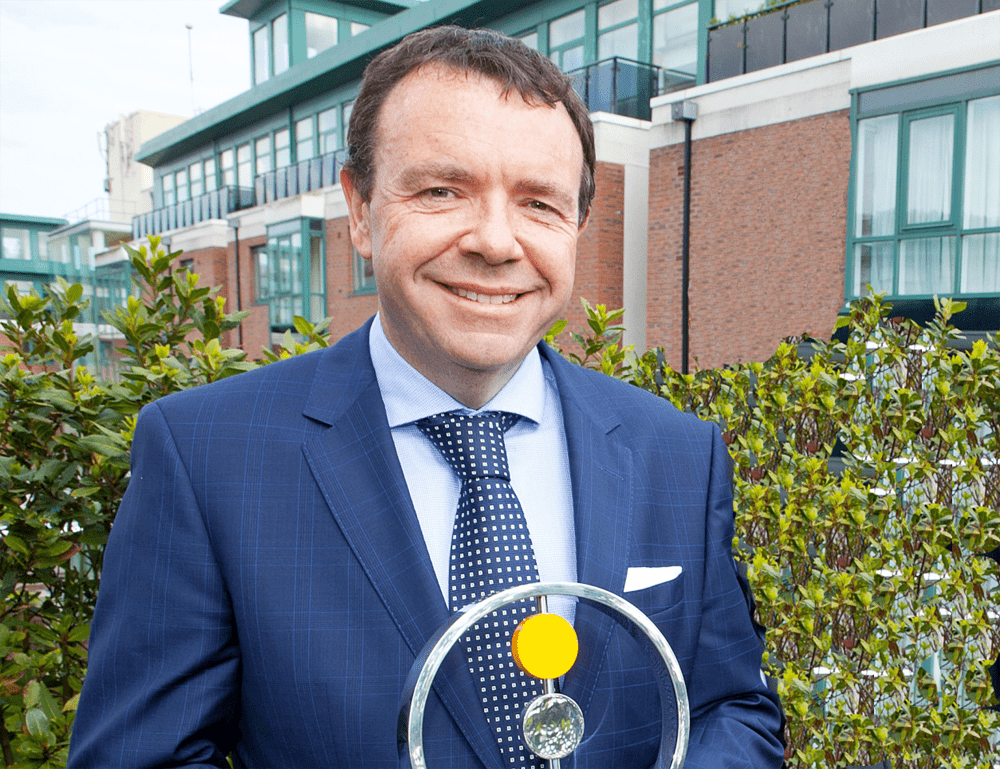Liam O’Kelly tells Niamh Mac Sweeney why innovation is key at AirSpeed Telecom and what the future holds for this ever changing industry.
Q: What does AirSpeed Telecom do?
A: AirSpeed Telecom provides managed telecommunication services to a multiple of enterprise, public sector and SME businesses in Ireland.
We deliver reliable, secure and scalable connectivity, including fibre and wireless up to multi-Gigabit level, as well as managed voice, data, UC, cloud and security services regardless of where your business is located nationwide.
We operate across the island of Ireland, with infrastructure in the UK and interconnect arrangements internationally which are used to service Irish companies who have global communications needs. For example we work with clients like Dairygold and UDG Healthcare, who have multiple sites around the world.
AirSpeed Telecom employs 50 at offices in Dublin, Cork and Belfast and clients include Zurich, Dairygold, Rusal, Kostal, Keelings Group, RTÉ, TG4, HEANet, OPW, NCSS (BreastCheck), Chill.ie, Irish Distillers and Vhi Healthcare. We also operate a Network Management Centre which provides customers with a pro-actively managed 24 x 7 x 365 service.None of our business is outsourced and our customers have unprecedented access to our technical support engineers.
Q: How did you set up a company in this industry specific sector?
A: I was a broadcast engineer and had set up a company called Viscom which built TV stations and broadcast facilities including TG4, Orbit Rome and Star TV Asia.
By 2002, new radio technologies were emerging and I could see that these had the real potential to offer an alternative telecommunications system that would deliver uncontended business broadband, high bandwidth network and reliable internet services to businesses all over Ireland – including business located in remote regions such as Donegal, Kerry and along the west coast of Ireland.
The existing operators weren’t meeting the business needs of customers and the lack of infrastructure meant available service was intermittent and expensive. In 2003, I decided to take a different direction and invested my time and resources in establishing AirSpeed Telecom to address this growing market.
Q: What challenges did you face in establishing and growing the business?
A: We had tested our technology in 2002, so when we launched in 2003 and began servicing customers and saw the pent-up demand for what we were doing, we knew instantly we had a viable operation on our hands. This was particularly evident in remote locations around Ireland where businesses were being hindered by a lack of high bandwidth in their area. We were able to overcome the technical challenges in these regions and deliver what our customers wanted – reliable and scalable connectivity. This meant we gained credibility very quickly, and this turned out to be a significant key to the success of the company.
Our business model hinged on delivering a reliable quality service which generated a recurring revenue model and would allow for steady growth. Since then, we have focused on generating recurring customer revenue and constantly innovating our products and services to meet ever evolving business needs.
Q: Do you have a strategy for growth for the future?
A: We plan on continuing to invest in technology and expertise in-house. Our focus on innovation and our policy of partnering with suppliers who are leaders in their technology has ensured a unique capability to cater for individual customer requirements. We work in partnership with our customers to provide highly engineered solutions for their emerging ICT needs.
Over the last 18 months alone, we have achieved in excess of 40% growth in revenue and added an additional 12 well qualified people to our team.
Innovation is key in this business and we are constantly developing our offering to ensure continued growth.
Q: How is this industry performing in Ireland?
A: While there is a buzz in the industry at the moment, I believe the marketplace will experience consolidation rather than expansion over the coming 18 months. We are also seeing moves such as partnerships between Vodafone and the ESB, ensuring that more wholesale products are becoming available. This will open the door for smaller IT vendors to offer basic products but we will also see more consolidation in the market as players look to retain as much of the spend as possible. We may also see an interest in more re-branded or own branded telecoms services – like the mobile virtual network operator (MVNO) offerings from Tesco and others.
Q: Last year it was announced that AirSpeed was to be acquired by Granahan McCourt Capital. Was this part of a long-term strategy for the company?
A: We were very satisfied with our organic growth strategy, but having new investors on board offers the opportunity to open new markets for us more quickly and allows us to continue to innovate to meet the emerging needs of our existing customer base.
Q: How did you position the company so that it was attractive to investors. And what advice do you have for firms looking to attract investors?
A: It really wasn’t about positioning AirSpeed Telecom to make it attractive to investors – it was more about careful choices and investments to set the business on a trajectory to ensure success.
We chose to invest carefully in our own people and never subcontracting any work, thereby ensuring consistent high quality service delivery.
We also invested in only the best equipment; always selecting only from the top three global vendors in any given product.
Similarly, we make smart choices from leading vendors in our business systems. This type of ethos has ensured AirSpeed Telecom has always been a profitable, bankable and indeed investable business over the years.
Q: What will this investment mean for AirSpeed and its future?
A: Granahan McCourt’s investment in AirSpeed Telecom was a great endorsement of what we have been doing, and validation that we have a solid, attractive business model that’s working.
Granahan McCourt sees AirSpeed Telecom as a model that can work in other markets. We’re now actively looking for opportunities to replicate our model internationally: building a full-service telco that incorporates licensed wireless, fibre, DSL and copper services, all managed through a well-engineered core that delivers data, internet and voice.
We know we’re exceptionally good at providing service in markets which are infrastructure-starved, and that’s what we’ll be looking to replicate internationally.
Q: It states you will remain with AirSpeed? Is this something that is important to you?
A: We’re entering a new phase with our business. We’ve worked hard to establish our brand, deliver the best quality of product and service to our customers and I’m not finished with that yet! We’re building our business at home and looking to build internationally. I have a fantastic team working with me and this, coupled with our new investment partners, means we have a great future ahead of us.
Q: What’s the best piece of advice you’ve ever been given?
A: The best you can do is the best you can do. In life no matter how hard you work, sometimes the ball won’t break your way. Control the ‘controllables’ and after that be forgiving of yourself. Life’s too short to cry over spilt milk.
Q: More than 10 years on since you established the company, are there new challenges you face today?
A: The one consistent factor over the past 10 years has been continual innovation.
Our challenge is to continue to identify and deliver innovations to clients before they even realise they need it. But when you love the industry as much as we do, this isn’t a chore!
Q: As an entrepreneur what’s the best advice you received and what advice do you have for others starting out?
A: ‘Separate your own personal labour ability from your overall earning potential’. As an individual, you can only do so much work and earn so much income. For example, if I was a plumber, I could only do plumbing work for eight hours a day. However, if I take the focus off my own labour, and employ 20 plumbers to work with me, this vastly increases my potential to earn. The trick is to be able to generate enough recurring revenue to keep the business sustainable.
Knowing what I know now, combined with the fact that we had a really strong business model and executed it really well, we should have grown quicker. We didn’t need to be as conservative as we were.
Hindsight is always a great thing.
Q: What do you attribute AirSpeed’s success to?
A: ‘A prudent strategy, combined with careful management of finances, has meant a year on year growth in excess of 40% despite the downturn in the market. An excellent team with real expertise has also been a huge factor in our success – and, of course, enjoying what we do – that’s important!





